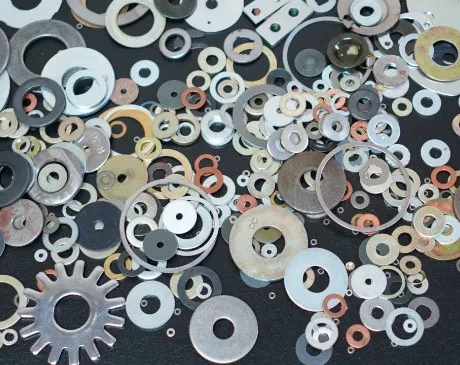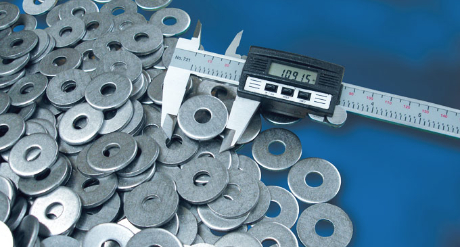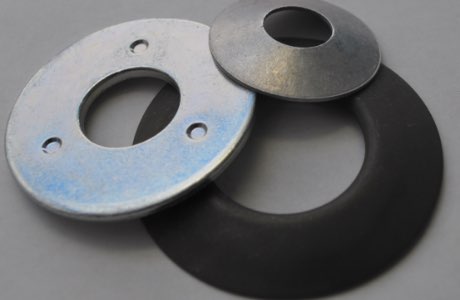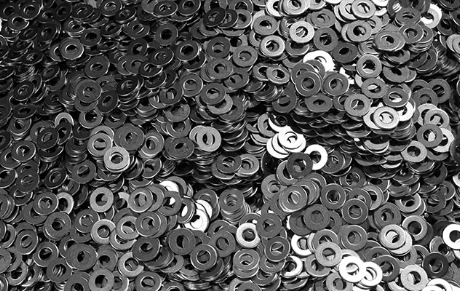STAINLESS STEEL WASHER STAMPING & MANUFACTURING
We produce stainless steel washers in various grades and specifications to meet a wide range of needs. Our selection includes flat washers, thick washers, large washers, shim washers, and stainless steel stampings all crafted to precise standards. We manufacture stainless steel washers in different grades, including 304, 316, 409, 410, and 430, ensuring they perform well in specific applications. Whether you need custom stainless steel washers for unique projects or standard sizes, our production facilities ensure accuracy and reliability. We are a trusted source for stainless steel washer solutions across multiple industries such as automotive, marine, aerospace, plumbing, industrial, and construction applications. Contact us for stainless steel washers made to your specifications.


STAINLESS STEEL FLAT WASHERS
Flat stainless steel washers are essential components used to distribute loads and prevent damage between surfaces. Made from high-quality stainless steel, they offer excellent corrosion resistance. Commonly used in numerous applications, stainless steel flat washers ensure secure and reliable connections in harsh environments.

STANDARD STAINLESS STEEL WASHERS
Stainless steel washers are typically ordered to specific industry standards and specifications to ensure they meet the required mechanical properties, dimensions, and performance criteria. Some common specifications include:
- ASTM Standards
-
-
- A276: Stainless steel bars/shapes; includes washers (e.g., 304, 316).
- A240: Stainless steel plates/sheets; washer manufacturing specs.
- F436: Flat washers; carbon/stainless/alloy steel tolerances and properties.
- F593: Stainless steel fasteners; includes washer assembly requirements.
-
- ISO Standards
-
-
- ISO 7089: General requirements for flat washers (material, dimensions, tolerances).
-
- DIN Standards
-
-
- DIN 125: Flat washers; dimensions and tolerances.
- DIN 6798: Washer specifications for various profiles and applications.
-
- BS Standards
-
-
- BS 4320: Plain washers; dimensions and material properties.
- BS EN 20898-1: Fastener surface coatings; corrosion resistance for washers.
-
- JIS Standards
-
-
- JIS B 1251: Flat washers; dimensions, tolerances, and materials.
-
- Custom Specifications
-
- Tailored to industry-specific requirements.
Key Considerations
- Material Grade: Corrosion resistance and strength (e.g., 304, 316).
- Dimensions: Inner/outer diameter, thickness.
- Tolerances: Dimensional precision.
- Finish: Surface quality for performance and aesthetics.
- Load Capacity: Resistance to applied loads.

STAINLESS STEEL WASHER GRADES
Below is a list of stainless steel grades, including their properties, advantages, and disadvantages:
- Austenitic Stainless Steels
-
-
- 304: Good corrosion resistance, weldable, non-magnetic.
- Pros: Affordable, versatile, formable.
- Cons: Lower strength, prone to stress corrosion cracking.
- 316: Superior chloride resistance, high-temperature durability, non-magnetic.
- Pros: Ideal for marine use.
- Cons: Costlier, harder to machine.
- 321: High-temperature resistance, titanium-stabilized, non-magnetic.
- Pros: Excellent weldability and reduced intergranular corrosion.
- Cons: Higher cost than 304.
- 304: Good corrosion resistance, weldable, non-magnetic.
-
- Ferritic Stainless Steels
-
-
- 430: Oxidation-resistant, magnetic, cost-effective.
- Pros: Affordable, mild corrosion resistance.
- Cons: Lower ductility, less severe corrosion resistance.
- 446: Excellent high-temp resistance, magnetic.
- Pros: Outstanding oxidation resistance.
- Cons: Brittle at low temps, poor weldability.
- 430: Oxidation-resistant, magnetic, cost-effective.
-
- Martensitic Stainless Steels
-
-
- 410: Heat-treatable, strong, magnetic.
- Pros: High strength, wear-resistant.
- Cons: Low corrosion resistance, brittle.
- 420: Harder than 410, magnetic.
- Pros: Excellent hardness and polishability.
- Cons: Poor corrosion resistance, brittle when hardened.
- 410: Heat-treatable, strong, magnetic.
-
- Duplex Stainless Steels
-
-
- 2205: High strength, chloride-resistant, magnetic.
- Pros: Cost-effective, strong.
- Cons: Challenging to machine and weld.
- 2507: Exceptional corrosion resistance, magnetic.
- Pros: Ideal for extreme environments.
- Cons: Expensive, difficult to work with.
- 2205: High strength, chloride-resistant, magnetic.
-
- Precipitation-Hardening Stainless Steels
-
- 17-4 PH: High strength, good corrosion resistance.
- Pros: Machinable, strong.
- Cons: Costly, limited formability.
- 15-5 PH: Tough, corrosion-resistant.
- Pros: Excellent machinability and strength.
- Cons: Expensive, precise heat treatment required.
- 17-4 PH: High strength, good corrosion resistance.
This comprehensive overview should help you understand the characteristics, advantages, and disadvantages of each stainless steel grade for different applications.
STAINLESS STEEL WASHERS FOR YOUR NEEDED APPLICATION
At Freeway Corporation, our team works closely with our customers to understand their projects and supply them with standard stamped washers and custom washers suited best for their applications. Our experience, skill and understanding of metal stamping allow us to manufacture high-quality stamped metal washers for a diverse set of industries. When you choose Freeway Corporation, you’re choosing a company you can trust with fair, competitive pricing.
WHY CHOOSE FREEWAY CORPORATION STAINLESS STEEL WASHERS?
Are stainless steel washers good?
Stainless steel washers are a good choice in multiple industries. Especially due to their corrosion resistance properties. Along with this, stainless steel washers can come with many different surfaces finished included dull, shiny, brushed, and polished.
What is the difference between zinc and stainless steel washers?
The difference between zinc and stainless steel washers is the substrate of material. Steel washers have the ability to rust, so they are normally plated with zinc in order to protect from corrosion. Stainless steel washers are already corrosion resistance because of the base material having corrosion resistant properties.
What is the difference between 300 series and 400 series stainless steel washers?
The differences between 300 series and 400 series stainless steel washers stem from their composition, corrosion resistance, strength, weldability, and typical applications. 300 series washers are preferred for environments with high corrosion risk, while 400 series washers are suitable for applications where strength and cost-effectiveness are more critical.
If you have any questions about our precision washers, our brass washer stamping equipment, our custom washer creation process or anything else, including a quote, feel free to contact us! You can speak to the sales team at our Cleveland office directly by calling 216-524-9700, or you can fill out an online contact form. You can also check out our FAQ page for more answers to commonly asked questions. We’re excited to hear from you.


